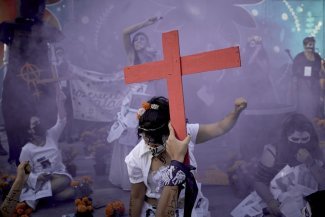Teachers from three education unions, SEC, ANDE and APSE, come together at a demonstration in the Costa Rican capital, San José.
The tax reform, presented by the Executive in September and approved by Congress in early December, led to a three-month strike in the public sector, most notably in education. In the spotlight: the right to strike and the ‘brushing aside’ of social actors.
In May 2018, Carlos Alvarado Quesada became the second president of the centre-left Citizen Action Party (PAC), and he did so with the support of other forces (including neoliberals). He managed it, moreover, in the context of a historic, highly polarised, election, after running against the Evangelical candidate Fabricio Alvarado Muñoz, from an emerging party proposing a shift towards ultraconservative policies.
This climate of polarisation is still palpable, in a society now divided over the issue of taxes, following the bill to ‘Strengthen Public Finances’ (popularly known as the Fiscal Plan), presented by the Executive’s economic team (the most neoliberal team), just four months after taking office, unleashing a wave of strikes and social conflicts that remain unresolved to this day.
According to the Costa Rican government, the plan is designed to achieve three clear objectives: to regain the confidence of international markets, to put an end to tax evasion, fraud and contraband, using VAT as the main tool, and to support public spending. The country’s budget deficit is forecast to reach 7 per cent of gross domestic product (GDP) in 2018 and the goal is to bring it down to 3 per cent with the approval of the tax reform.
The need for this reform was discussed by the last two governments, but neither the presidency of Laura Chinchilla Miranda (2010-2014) nor that of Luis Guillermo Solís (2014-2018) – the latter of the same party as Alvarado Quesada – placed the controversial issue on the legislative agenda.
The opposition maintains that the reform will be detrimental to the country’s middle and lower income groups, and rejected it from the moment it was presented.
Concrete manifestations of the opposition to the reform include the mass strike launched by the entire public sector on 10 September, and the use of various delaying tactics, such as a hearing before the Constitutional Chamber on the possible repercussions of the bill on the workings of the judiciary.
On 23 November, the Constitutional Court of Costa Rica ruled that the bill did not clash with the workings of the judiciary and could be voted on by the Costa Rican Legislative Assembly. In other words, it gave the green light to the debate of the bill and its approval by Parliament and denied that cutting the employee benefits in the judicial sector could have undesirable effects: corruption of judicial officials and lack of judicial independence.
From conflicting positions…
Nogui Acosta, Costa Rica’s deputy finance minister, told Equal Times that failure to approve the fiscal plan would lead to a loss of confidence in the state’s ability to meet its commitments, followed by rising interest rates and rising inflation. This would in turn lead to the impoverishment of the population in Costa Rica, where the middle class is highly indebted, especially in US dollars, and a significant decline in purchasing power, amongst other things.
“The analyses that we have conducted from a fiscal perspective, and [the analyses] of other economists, indicate that 80 per cent of the taxes collected would come from the richest 20 per cent of Costa Rican households and, in this sense, I think they are mistaken in their criticism, because when there is a cross-the-board exemption on to the basic shopping basket it benefits both the rich and the poor. When we proposed the bill, we visualised ourselves in an environment where traceability could serve as the fundamental pillar of VAT implementation, which is why the bill meets expectations,” stressed the deputy minister.
Other government proposals include reducing public spending by cutting and merging public bodies, and a bill on the taxation of large cooperatives.
Edgardo Morales, general secretary of SEC (the Trade Union of Education Workers), emphatically expressed the union’s opposition to the entire bill. In his view, the country needs a solidarity-based fiscal reform, drawn up in consultation with all the stakeholders.
In addition to its underlying principles, one of the problems of the reform is, indeed, the fact that it has been put together without taking on board the proposals of the various social actors.
“The fiscal reform puts the tax burden on consumption, affecting the poorest families. It does not solve the causes of the fiscal deficit. It does not secure the resources required to get the country out of the fiscal crisis. It will create more poverty by raising the cost of living. It takes life out of the economy, as it reduces consumption and increases unemployment. It promotes tax breaks for big capital. It de-funds the public sector, which potentially weakens public services, and limits the budget for social programs, to pay state debt,” summarises Morales.
The clash between the new government and the unions rapidly led to waning support for both sides. The most widespread criticism levelled against the strikers, channelled through the national media and social networks, can be summed up as the perception that they are defending their own benefits and not the rights of the population as a whole, since the fiscal plan cuts their fringe benefits, for example. The government, for its part, is accused of designing a reform that protects the rich at the expense of the working classes, given that large corporations, alleged tax evaders, are not, for example, punished by the Department of Direct Taxation, as is the case with small taxpayers.
On 5 December, following the approval of the fiscal plan, the Ministry of Finance published a list of large corporations that report zero income or losses to the treasury (131 in total). It also mentioned that “of this group, 96 companies have been inspected, generating 560 billion colones [around €827 million, $936 million] in tax adjustments, and the filing of seven criminal complaints”. The total number of large taxpayers includes 462 companies. The list was made known thanks to civil society actions, which obliged the Ministry to publish it in line with a decision of the Constitutional Chamber.
…to entrenchment
“Strikes are just one of the various protest mechanisms. All my fellow workers or colleagues have the right to disagree with a principle or a proposal, but protest mechanisms do not have to affect the students,” Maria Alexandra Arroyo, director of curriculum development for the Ministry of Public Education, told Equal Times.
The country is torn, with accusations of rights violations affecting students (with stoppages bringing almost all the education centres in the country to a standstill), patients (2000 surgical procedures and 39,000 appointments had to be cancelled across the country), and the beneficiaries of assistance from public institutions, on the one hand, whilst the unions, on the other, claim that their right to strike has been violated and that they have been mistreated by the press and authorities.
On 9 November, the Association of Secondary School Teachers (APSE), together with two other bodies, denounced the government of Costa Rica to the Committee on Freedom of Association of the International Labour Organization (ILO) for violations of freedom of association, collective bargaining rights and the right to strike. In a video, teachers’ union ANDE (the National Association of Educators) denounced multiple abuses and the lack of openness to dialogue.
Since September, several court rulings have declared the indefinite strike carried out by various public sector workers (from port to health and education workers) illegal, on grounds such as it ‘not being peaceful’, ‘affecting essential services’ and infringing the principles of ‘reasonableness’ and ‘proportionality’.
The result has been the gradual withdrawal from the strike, after failing to stop the reform and the rulings declaring the strike illegal, of all the trade unions, with exception of two representing the education sector: ANDE and APSE.
Costa Rica, a stable democracy and one of the few countries in the world that does not have an army, has been taken aback by this political and social crisis, and its entrenchment, made worse by the physical attack on President Carlos Alvarado (on 3 October by trade unionists) and the gender violence against several female deputies (on social media – including a death threat – and insults posted by teachers on the walls of the Congress), violence from which the ANDE has dissociated itself.
On Monday 10 December, the ANDE and the APSE, the last unions still engaged in the battle with the government, decided to halt the strike, given the approach of the end-of-school-year holidays, to enable the allocation of places for next year and to finalise the process of issuing grades to students. They are, however, promising renewed mobilisations in 2019.
Looking ahead to 2019 and following the approval of the fiscal plan, the government seemingly intends to strengthen dialogue and national agreements, as indicated by its plan to activate the Economic and Social Council (to agree on economic and development issues for the country) and the request for assistance for the State of the Nation Programme and the National Council of Rectors, all with a view to creating channels for citizen participation and consultation, according to the press.
The government’s commitment to opening a dialogue, which will include social actors, is seen as “an opportunity for the demands of the union movement to be heard and taken into account,” union sources told Equal Times, something that was not achieved during the preparation of the fiscal plan or the 88 days of strike action.
Despite the wearing down of the trade unions, according to these same sources, “the president of the Republic and his closest team are fully aware that they need an alliance with a strong union movement to advance the social agenda and stop the most neoliberal tendencies” of this government of national unity.










